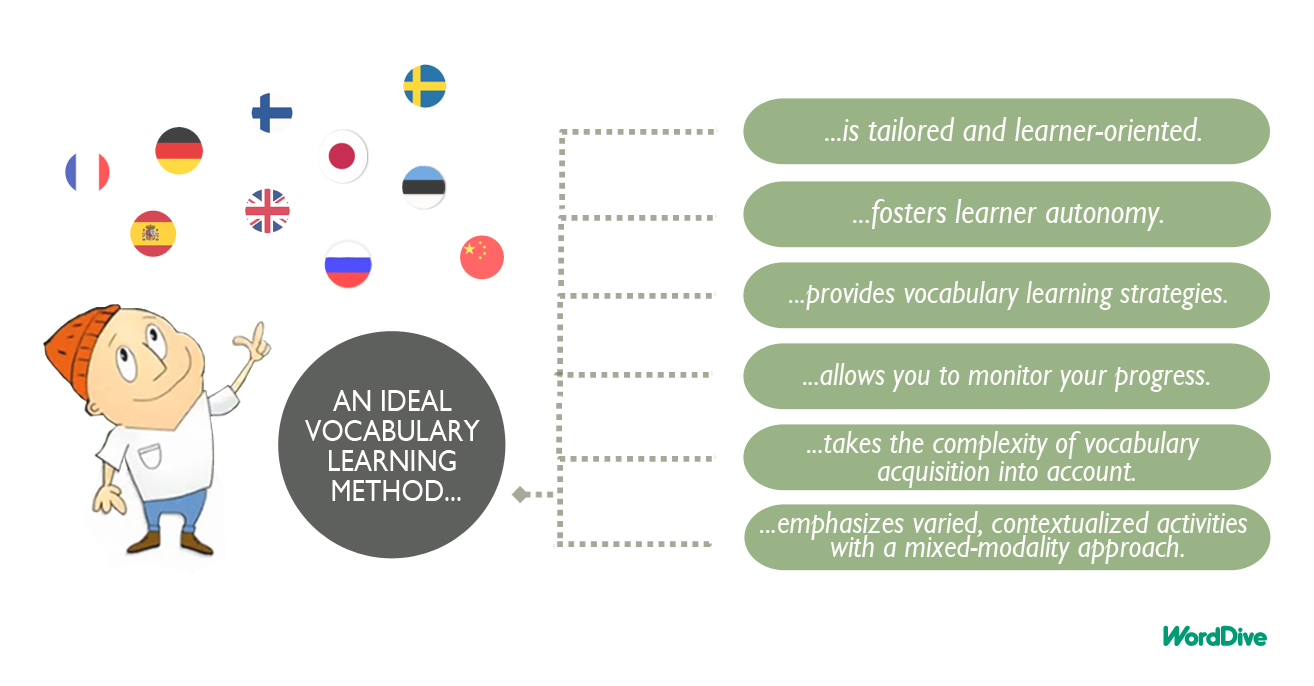Vocabulary is no longer an overlooked, secondary aspect of language learning. Unfortunately, despite the increase in the field of vocabulary research, it seems that the new theoretical findings have not fully reached the practice of second and foreign language instruction (1). Although both teachers and learners tend to recognize the importance of vocabulary in mastering a new language, there is still an apparent lack of widely applied, efficient vocabulary learning and teaching methods. Some teachers see vocabulary acquisition as something that can take care of itself (2), while many learners might still perceive it as an overwhelming task of mechanically memorizing word lists.
In their much-cited article, Scarcella and Oxford (3) outline a new, research-based approach to second language vocabulary instruction, especially oriented for adult learners. Based on their notions and other relevant research – without forgetting what we have learned in the previous articles – we have put together a list of characteristics which are worth considering when seeking for an optimum way to learn or teach second and foreign language vocabulary. If you want the vocabulary learning process to be as effective, easy and fast as possible, make sure to choose a method that…
1. …is tailored and learner-oriented.
Instead of being haphazard, vocabulary instruction should be tailored to the student’s individual needs, learning styles, and goals (3). For example, if the main motivation for learning languages is travel, the essential vocabulary is not the same as when someone needs to learn a new language for academic purposes. An ideal vocabulary learning method also takes into account learners’ individual differences, which have been proven to have a great influence on vocabulary learning process (4). In addition, special emphasis should also be laid on accurately defining the right difficulty level for the tasks. Tasks beyond the learners’ ability will do little to further vocabulary development, which makes the learners more likely to become overwhelmed and frustrated (1).
2. …fosters learner autonomy.
As Paul Nation (5) points out: “No matter what the teacher does or what the course book says, ultimately it is the learner who does the learning.” Outcomes in vocabulary learning are significantly better if learners take control and assume responsibility for their own learning (5) – it goes without saying that a teacher can never just “transfer” new words to the learner’s long-term memory.
3. …provides and boosts effective vocabulary learning strategies.
In order for learners to successfully take responsibility for their own learning, they need to know how to learn effectively. Traditionally, little effort has been made to teach students strategies for learning vocabulary (3), but over the last decades the focus has shifted to providing and teaching students effective learning strategies (6) – i.e. “specific actions taken by the learner to make learning easier, faster, more enjoyable, more self-directed, more effective, and more transferable to new situations” (7). Developed skills in learning-how-to-learn will make the learner better equipped to continue with language learning also on their own outside of the classroom (6).
4. …allows you to monitor your progress.
Language learning is a long-term task that can be frustrating or even disappointing if successful communication does not occur. It is very important that learners have ways to monitor their progress, encouraging them to keep on with the language studies. Just a simple record of learned words can give the learner a feeling of achievement and make the vocabulary learning more goal-oriented by breaking a big task down into smaller short-term goals. (5)
5. …takes the complex nature of vocabulary acquisition into account.
Learning vocabulary is not an easy task, which is why it is so important to choose a learning method that is based on understanding and knowledge of the complexity of the vocabulary acquisition process itself: specific needs have to be met in different stages of this incremental, gradual process in order for it to be effective. Furthermore, vocabulary will be better mastered if learners themselves are aware of what it means to know words and the processes involved in learning new words (3) – this also being, obviously, one of the main goals of this blog!
6. …emphasizes varied, contextualized activities with a mixed-modality approach.
Traditionally vocabulary learning has been associated with monotonous memorization of word lists. However, this kind of decontextualized activity is proven to be less effective than the ones that provide some kind of context for the words that are studied. Although direct, conscious study is also needed, learning words indirectly through written and oral contexts (i.e. reading and listening) contributes majorly to foreign vocabulary development. (3) On the other hand, studies have also shown that using multiple senses (e.g. combining written words with images and audio) stimulates the greatest learning and the best retention (8).
So the question remains: how does WordDive meet these research-based expectations for an efficient, modern vocabulary learning method? Next month we will tell you all about it by reviewing WordDive’s pivotal features in an article dedicated to all of you current and future WordDive users!
Happy language learning!
Mona
WordDive team
References and Further Reading:
(1) Duppenthaler, Peter (2007). Vocabulary Acquisition: The Research and Its Pedagogical Implications.
(2) Nation, Paul (1990). Teaching and learning vocabulary. New York: Newbury.
(3) Oxford, Rebecca & Robin Scarcella (1994). Second Language Vocabulary Learning Among Adults: State Of The Art In Vocabulary Instruction. System, 22(2): 231-243.
(4) Wu, Jing (2011). Study on Learning Style-based Computer-assisted Vocabulary Learning. Paper presented at International Conference “ICT for Language Learning” (4th edition).
(5) Nation, Paul (1998). Helping learners take control of their vocabulary learning. GRETA 6(1): 9-18.
(6) Wonga, Lillian L.C. & David Nunan (2011). The learning styles and strategies of effective language learners. System 39(2), 144–163.
(7) Oxford, Rebecca (1990). Language learning strategies: What every teacher should know. New York: Newbury House.
(8) Tight, Daniel G. Perceptual Learning Style Matching and L2 Vocabulary Acquisition. Language Learning 60(4), 792–833.
A mighty mix of language learning professionals, engineers, designers, user interface developers, gamers and psychologists.









1 Comment
[…] observed in August, despite the increased interest in vocabulary among linguists, it seems that the new, […]